Growth and Prosperity:
1945-2008
1945-2008
About
Prosperity was good for the arts in Enumclaw. The city established an arts commission and arts coordinator position, and in 1989, Karen Buege and Ann Prothro formed an independent non-profit group, Arts Alive, The town now has two art galleries--Arts Alive and City Hall. The arts community hosts several art walks, an annual Art in the Garden, Artists' Studio Tour, Art on Cole Street at Street Fair, and other events. When Enumclaw was searching for a theme in 2004, The City of Arts and Gardens was one suggestion, but received no response.
Enumclaw became a draw to more than just tourists. On June 3, 2008, Canadian-based Black Press bought the Courier-Herald. The locally owned Courier and Herald were both founded more than a century earlier, and merged in 1933. Also in 2008, the Swiss global giant Nestle Corporation tried to buy half of Enumclaw's water supply, but a broad-based outcry from farmers, environmentalists, builders, and homeowners put a stop to the plan before an agreement could be signed.
In 2008, prosperity peaked in Enumclaw. A typical house was worth 2 1/2 times what it was just a decade earlier. Median household annual income increased by $10,000 in the same time period. In four years, the crime index in Enumclaw dropped from 292 to 128 (U.S. average = 319).4 Life was looking pretty good for people here. That was about to change for many of them.
Enumclaw became a draw to more than just tourists. On June 3, 2008, Canadian-based Black Press bought the Courier-Herald. The locally owned Courier and Herald were both founded more than a century earlier, and merged in 1933. Also in 2008, the Swiss global giant Nestle Corporation tried to buy half of Enumclaw's water supply, but a broad-based outcry from farmers, environmentalists, builders, and homeowners put a stop to the plan before an agreement could be signed.
In 2008, prosperity peaked in Enumclaw. A typical house was worth 2 1/2 times what it was just a decade earlier. Median household annual income increased by $10,000 in the same time period. In four years, the crime index in Enumclaw dropped from 292 to 128 (U.S. average = 319).4 Life was looking pretty good for people here. That was about to change for many of them.

One of the first major events in Enumclaw after World War II was completion of the 432-foot high Mud Mountain Dam. Delayed by the war, the Army Corp of Engineers turned its attention to peacetime projects. The highest earthen dam in the world at the time, it spared the Puyallup and Kent valleys the often devastating annual flooding, deluges that had destroyed four bridges between Enumclaw and Buckley.
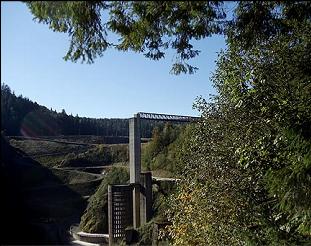
Mud Mountain Dam
As the nation turned from a war to a peacetime economy, it experienced growth and prosperity unprecedented in our history, and Enumclaw shared in the abundance. The population of Enumclaw more than quadrupled between the end of World War II and the turn of the century. Logging and lumber, mainstays of the local economy, thrived during much of this period. Farmers' Mutual expanded outside Washington in 1952 and became Mutual of Enumclaw in 1966, (1) and Farman's Pickles became a household word around the country. In 1962, Crystal Mountain opened, and put Enumclaw on a world stage in 1965 when it hosted the Alpine Ski Campionship. (2)
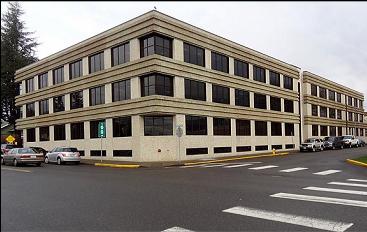
Farmers' Mutual Became
Mutual of Enumclaw in 1966
Mutual of Enumclaw in 1966
Growth and prosperity for the town brought other changes. The Cooperative Creamery closed its doors in 1951 as dairies moved to Darigold, and the Rochdale Cooperative Store Company dissolved in 1960. Garrett's skidder was copied by John Deere, Case, Caterpillar, and others. Nalley's bought out Farman's Pickles in 1987 and Crystal Mountain was sold to a Michigan-based resort corporation. Weyerhaeuser closed its mill and in 2002 sold the White River Tree Farm to a Boston insurance company that is now a subsidiary of Canadian Manulife Financial. And in a unique twist of fate, the Muckleshoot Tribe purchased that forest, its own ancestral lands, in 2013.
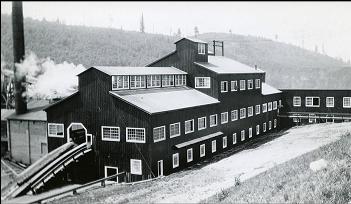
Weyerheauser Mill closed in 2002.
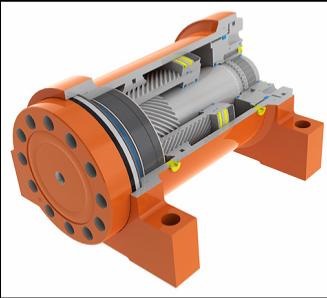
The big corporations didn't acquire all the locals, though. Paul Weyer opened a machine shop in 1968 and developed something called helical actuators. Most of us have no idea what they are, but the actuators are critical parts for equipment in construction, agriculture, mining, the military, trucking, and energy. Their equipment moves everything from loader buckets to solar collectors, and they've sold more than 500,000 actuators so far. Enumclaw's Weyer Machine, now Helac, is the world leader in the field, and remains a local family partnership. (3)
Helac helical actuator
At the same time, the town of farmers, loggers, and mill workers was changing with the arrival of commuters. Suburbia was the dominant demographic feature of the second half of the 20th century. For Enumclaw, that meant converting farms into housing developments. Many employees at Boeing, PACCAR, and other large manufacturing companies followed the trend to move here. Beginning in the 1960s, the surrounding farms and ranches became magnets for airline pilots and later for thoroughbred horse breeders. Toward the end of the century, large numbers of high tech workers became our neighbors.
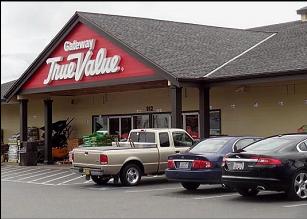
Gateway Hardware has been a family-owned business for three generations.
Prosperity brought many more tourists through Enumclaw, including my family from New Jersey. The town was a gateway to both summer and winter recreation, and the visitors spent money here. To capture more of these dollars in transit, the business community and the city hired consultants at various times to tell them how. One dilemma was whether to capitalize on the "gateway" image or become a destination instead. Those who thought a destination would be more profitable explored various ideas for the city, including a Bavarian motiff and an equestrian theme, but none has been settled upon yet. It appears now that Enumclaw may become both a gateway and a destination.
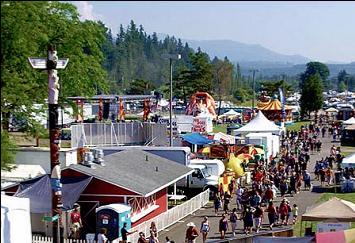
The destination advocates received a big boost in 2006 when the city acquired the King County Fairgrounds and facilities. Founded in Renton sixteen years before the Stevensons homesteaded downtown Enumclaw, the Fair moved to Enumclaw (on county land) shortly after World War II. Though it has been a challenge balancing income and expense, it appears the town is moving the Expo Center in the direction of profitability. In the meantime, thousands of people are coming to Enumclaw and spending money here. Major events besides the County Fair have included the Highland Games, Creationfest, various animal shows, Octoberfest, and the Wine and Chocolate Festival.
Enumclaw Expo Center
